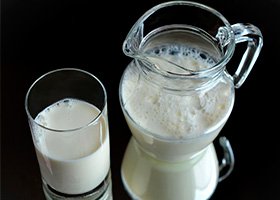
All iLive content is medically reviewed or fact checked to ensure as much factual accuracy as possible.
We have strict sourcing guidelines and only link to reputable media sites, academic research institutions and, whenever possible, medically peer reviewed studies. Note that the numbers in parentheses ([1], [2], etc.) are clickable links to these studies.
If you feel that any of our content is inaccurate, out-of-date, or otherwise questionable, please select it and press Ctrl + Enter.
Dairy products in the diet: to be or not to be?
Last reviewed: 02.07.2025
 ">
">Many people who care about their health try to reduce the amount of animal fats in their diet by refusing dairy products. After all, it is known that such fats have a negative effect on the cardiovascular system. Scientists from Poland warn: the benefits of consuming kefir, yogurt or cheese are much greater than the imaginary or probable harm.
Experts have proven that patients who regularly include hard cheeses or fermented milk products in their diet are less likely to have strokes and cardiovascular complications. The only exception may be fresh milk: this product has long been associated with an increased risk of coronary diseases.
Dr. Maciej Banasz, representing the Medical University of Lodz, analyzed the information obtained from American social surveys. The doctor's speech at a conference during the meeting of the European Society of Cardiology in Munich came as a surprise to many.
The professor pointed out some contradictions in the results of scientific work.
Cardiovascular diseases, such as heart attacks and strokes, are caused by damage to the blood vessels that are vital to life. Even with the advent of new effective treatments, such as thromboextraction or thrombolysis, the mortality rate after stroke remains extremely high. In the United States, stroke is considered one of the leading causes of death.
For a long time, doctors believed that large amounts of saturated fat from dairy products increased the risk of premature death – for example, from stroke or cancer. However, today scientists have increasingly come to the conclusion that completely eliminating dairy products is wrong and has no clear evidence base. An assessment of the information obtained during three dozen surveys of American adults only confirmed that products made from cow's milk are not so harmful.
About twenty years ago, the American Center for Disease Control and Prevention conducted a large-scale study known as NHANES. Medical specialists assessed the health, diet, and lifestyle of almost 25,000 volunteers for ten years, tracking any potential dangerous factors. The analysis of the information obtained was conducted by Polish scientists. They were able to establish that eating any dairy products helps reduce the mortality rate from any cause by 2%. And those who regularly eat hard cheese lived 8% longer than other participants.
The researchers then reviewed the progress of twelve more experiments and analyzed information on more than 600,000 patients from around the world. Based on the results, the scientists came to an interesting conclusion: the benefits of dairy products are truly significant, which cannot be said, perhaps, about fresh whole milk. Drinking “pure” milk can increase the mortality rate by 4%. But you still shouldn’t give up natural yogurts, cheeses, and cottage cheese.
The information is published on the page https://medbe.ru/news/pitanie-i-diety/ne-ogranichivayte-molochnye-produkty/

 [
[